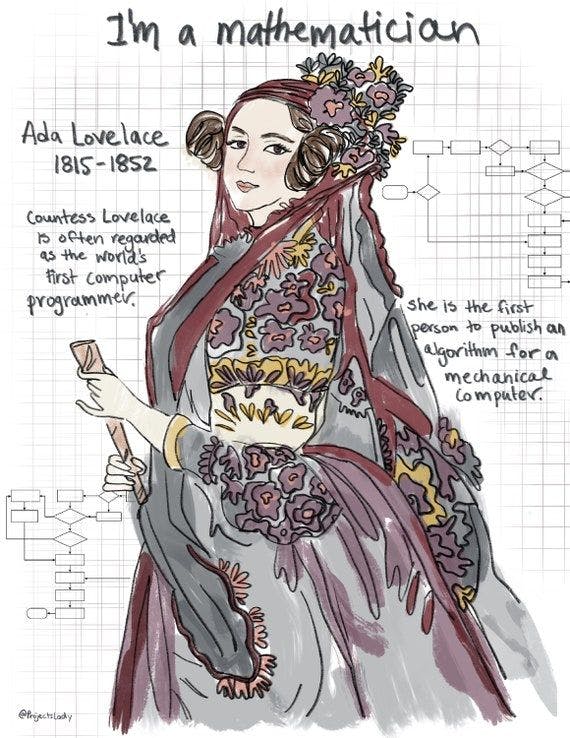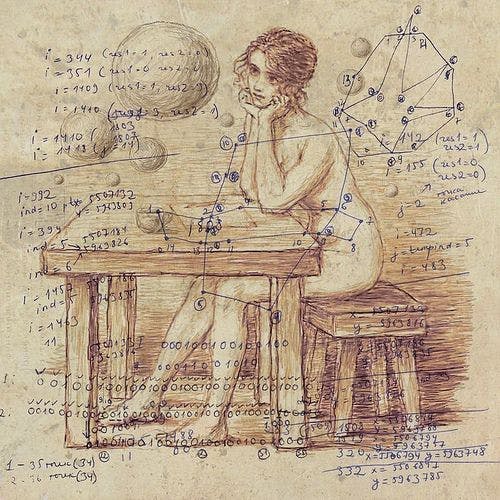Women are often hailed as multitasking maestros, effortlessly juggling various tasks simultaneously. Whether it's managing a career, family, or social life, they seem to have a knack for keeping numerous plates spinning. So directly or indirectly women are jugglers🤹♀️.**
Women play crucial roles as daughters, sisters, friends, and wives. Now, they are also becoming mothers of technology.
The history of women in technology is a narrative of resilience, innovation, and gradual progression. Despite facing systemic barriers and gender biases, women have made significant contributions to the tech industry throughout history.
Early Pioneers (19th - Early 20th Century):
Ada Lovelace (1815-1852): Often regarded as the world's first computer programmer, Ada Lovelace collaborated with Charles Babbage on his Analytical Engine. Her notes on the engine included an algorithm intended for processing by the machine, making her a visionary in the field of computing.

World War II and the ENIAC Programmers (1940s):
- ENIAC Programmers (1940s): During World War II, women stepped in as the United States faced a shortage of male mathematicians and engineers. Six women—Kay McNulty, Betty Jennings, Betty Snyder, Marlyn Wescoff, Fran Bilas, and Ruth Lichterman—became the first programmers of the Electronic Numerical Integrator and Computer (ENIAC), one of the earliest electronic general-purpose computers.
Rise of Computer Science (1950s - 1960s):
- Grace Hopper (1906-1992): Known as the "Mother of COBOL," Grace Hopper was a computer scientist and United States Navy rear admiral. She played a pivotal role in the development of the COBOL programming language and contributed to the development of UNIVAC I, one of the earliest commercial computers.
Software and Gaming (1970s - 1980s):
Margaret Hamilton: Margaret Hamilton, Director of the Software Engineering Division of MIT Instrumentation Laboratory, led the team that developed the software for NASA's Apollo missions. Her work was crucial for the success of the moon landing.
Carol Shaw: In the world of gaming, Carol Shaw became one of the first female video game designers. She is best known for her work on the Atari 2600 game "River Raid," released in 1982.
Internet and Dot-Com Era (1990s):
- Radia Perlman: Often dubbed the "Mother of the Internet," Radia Perlman is a computer programmer and network engineer. Her work on the Spanning Tree Protocol (STP) played a fundamental role in the development of modern computer networks.
Contemporary Contributions (2000s - Present):
Shafi Goldwasser: A renowned computer scientist, Shafi Goldwasser has made significant contributions to the fields of cryptography and complexity theory. She was awarded the Turing Award in 2012.
Reshma Saujani: Founder of Girls Who Code, Reshma Saujani has been a vocal advocate for closing the gender gap in technology. Girls Who Code is a nonprofit organization that aims to inspire and support young women to pursue careers in tech.

Collective Wins: Celebrating Each Other's Success
Success is not a finite resource. We explore how women in tech are building a culture of celebration rather than competition. From acknowledging small victories to applauding major milestones, this section emphasizes the power of collective wins and how uplifting one another contributes to a more inclusive and supportive tech community.
The narrative of women in tech is not about comparison or competition with men; it's about recognizing and celebrating the unique contributions, perspectives, and talents that women bring to the field.
Pat on the Back: A Boost in Confidence
Acknowledgment goes beyond mere words; it's a powerful boost to one's confidence. Explore stories of women in tech who, with a pat on the back, found the motivation to tackle new challenges and reach new heights in their careers. A simple gesture can have a profound impact.
A Culture of Inclusion: Nurturing Respectful Environments
Building a culture of inclusion is fundamental to fostering equal respect. Explore how workplaces can create environments that value and respect the unique perspectives of both men and women. From inclusive policies to promoting diversity in project teams, let's discuss the steps toward cultivating a truly inclusive tech culture.
Current Scenario:
There are numerous programs and initiatives designed to support and empower women in the tech industry. These programs aim to provide mentorship, networking opportunities, skill development, and a supportive community.
Global Programs:
Girls Who Code:
Focus: Encouraging girls to pursue computer science and STEM fields.
Activities: Offers summer immersion programs, after-school clubs, and various resources for girls interested in coding.
Women Who Code:
Focus: Connecting women in technology and providing resources for career development.
Activities: Networking events, coding workshops, hackathons, and leadership opportunities.
-
Focus: Advancing women in technology globally.
Activities: Hosts the Grace Hopper Celebration, the world's largest gathering of women in computing, and offers various programs and resources.
TechWomen:
Focus: Empowering women in STEM from Africa, Central and South Asia, and the Middle East.
Activities: Mentoring, professional development, and cultural exchange opportunities.
Women Techmakers by Google:
Focus: Supporting women in tech through community-building and resources.
Activities: Offers scholarships, provides resources for skill development, and hosts events.
Region-Specific Programs:
Europe - Women in Tech (WIT) Network:
Focus: Connecting and supporting women in the European tech industry.
Activities: Networking events, mentorship programs, and workshops.
India - Women Who Code Delhi:
Focus: Empowering women in technology in the Delhi region.
Activities: Meetups, hackathons, and skill-building workshops.
Africa - AfriLabs Women in Tech Program:
Focus: Supporting African women in the tech and innovation space.
Activities: Mentorship, training, and networking opportunities.
Latin America - Laboratoria:
Focus: Training women in Latin America for tech jobs through coding bootcamps.
Activities: Intensive coding programs, mentorship, and job placement support.
Middle East - Women in Technology (WIT) Middle East:
- Focus: Connecting and empowering women in the Middle East tech community.
Activities: Conferences, networking events, and mentorship programs.
Connect with Me:
🌐 Follow Me:
Twitter: @parinitapatil18
Github: parinitapatil
